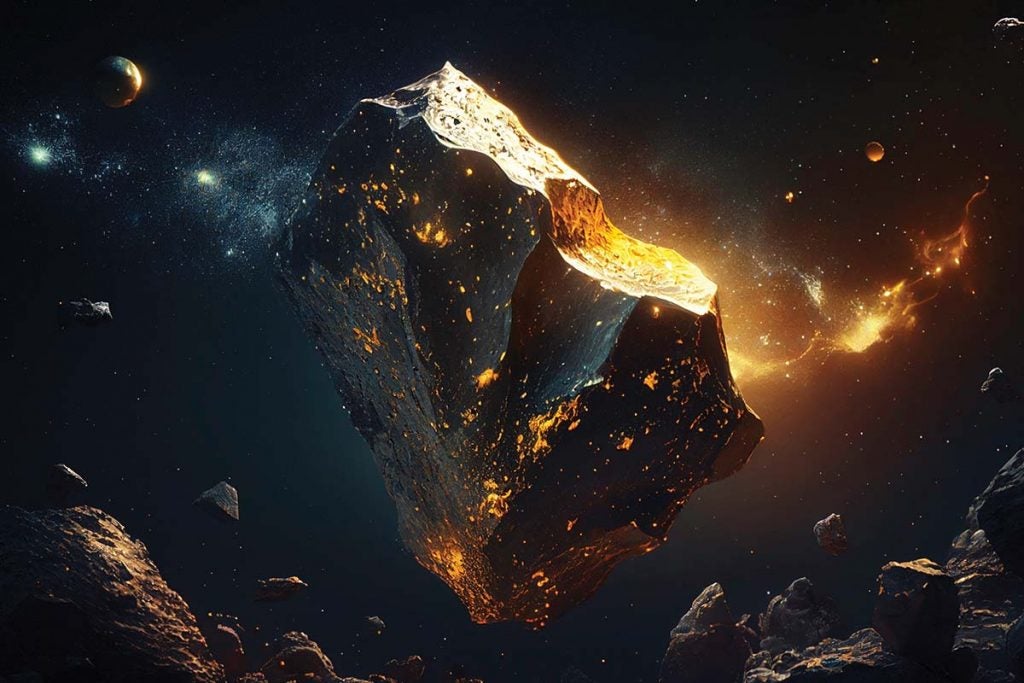
Phil Metzger ’00MS ’05PhD was like most boys in the 1970s. On clear nights he’d look at the moon and a faint red dot — Mars — and wonder what it would be like to touch them. He also contemplated a question people have asked for millennia:
“Does life exist out there?”
The Metzger family lived in Titusville, Florida, so even before he started a 29-year career at NASA or thought of working as a planetary scientist at ����첥, young Phil saw with his own eyes what other kids could barely picture in their daydreams. Rockets. Power. Progress. Right outside his bedroom window.
“I’ve always wanted to work on anything that involves people walking on the surface of another planet,” he says. Metzger has done so much studying and testing over the years that he can confidently answer the ancient question about if life exists out there.
The lives out there will soon be ours.
“People in this field are convinced great things will happen in the next 10 or 20 years,” Metzger says.
NASA, with more than 50 years of research support from ����첥, has built up the Artemis program — with the goal of establishing a sustainable human presence on the moon and preparing for missions to Mars. Congress has asked NASA to send humans to Mars by 2033. SpaceX founder Elon Musk believes his company, which has a deep roster of ����첥 alumni, will send as many as a million people to build a city on Mars by 2050. Amazon founder Jeff Bezos launched Blue Origin in 2000 with the idea that millions of people will soon be living and working in space.
“This will affect all of us, whether we want it to or not,” Metzger says. “We need to be proactive and ensure that life in space has a good outcome.”
That means we could have a limited time to figure out some of the biggest questions humankind has ever faced — or until now, has never faced.
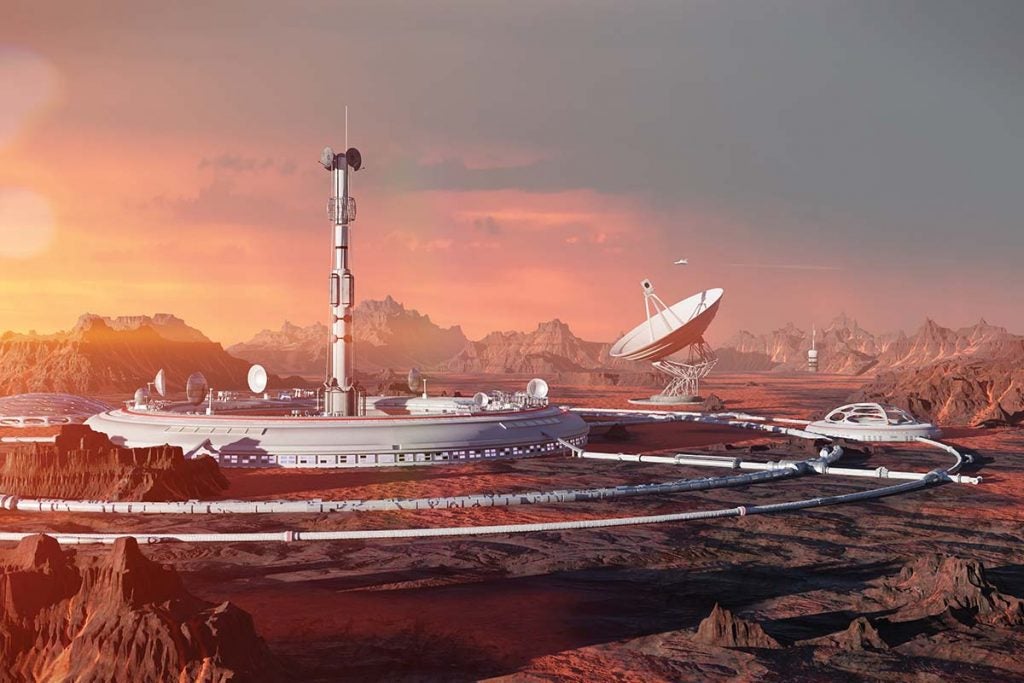
The Question of Purpose
Political Science Professor Roger Handberg began working at ����첥 in 1972, the same year as America’s last Apollo flight. Since then, Handberg has paid close attention to the Space Shuttle’s development, the deployment of a space station and updates from robots collecting data on Mars. As far back as the early 1990s he had the foresight to interlace his expertise in space history with a specialization in a rare niche for that time: space policy.
“Technology is moving fast,” Handberg says, “but our imaginations move faster. That’s what fuels space exploration.”
“Technology is moving fast, but our imaginations move faster. That’s what fuels space exploration.”
— Roger Handberg, professor of political science
Handberg doesn’t doubt there will be some sort of habitation beyond Earth within 100 years, but he does wonder if there’s been so much imagining about getting there and sustaining life there that we’ve neglected how to make life there worthwhile. As astronomer Carl Sagan wrote more than 40 years ago in his book Cosmos, “There will be a time when Mars is all explored … a time after rovers have combed the surface … a time after human beings have walked the sands of Mars. What then? What shall we do with Mars?”
“That’s still a good question, even with all the progress we’ve made,” Handberg says.
In the 2015 movie The Martian, Matt Damon’s character spends his time on the red planet trying to survive. He grows food. He explores. He figures things out to save himself and make life a little more predictable for the next person who dares to travel to Mars.

“Those scenes were inspired from the work we’ve been doing for decades,” says Kathleen Loftin ’89 ’00MS ’09PhD, center chief technologist at Kennedy Space Center. “The purpose is much bigger than basic survival. It ties back to cleaning up Earth and minimizing our use of resources here.”
When Handberg began teaching at ����첥 50 years ago, the United Nations estimated the world population at 3.8 billion. In November 2022, the number touched 8 billion.
“We’re on a planet, a fixed sphere, with a limited surface area and limited resources,” Metzger says. “We can’t continue to demand more from this planet. But if we gather resources from other spheres, then we can live abundantly and solve problems here on Earth at the same time. We wouldn’t have to choose one or the other.”
Metzger says he believes 100% of the energy sector and 50% of our entire industrial footprint could be moved off this planet by 2100.
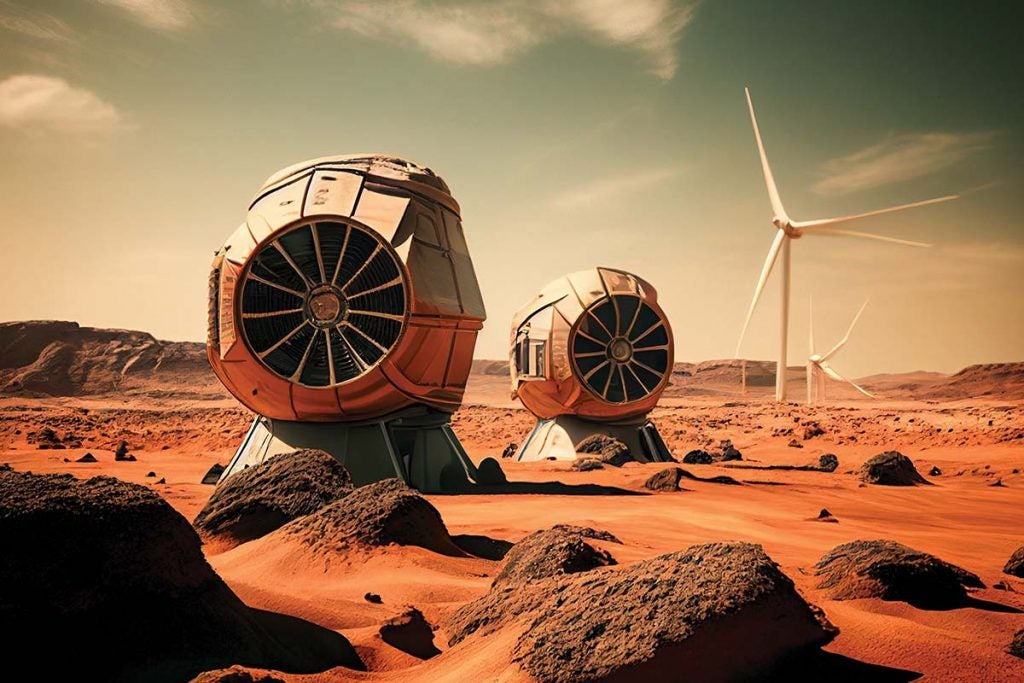
“The purpose is much bigger than basic survival. It ties back to cleaning up Earth and minimizing our use of resources here.”
— Kathleen Loftin ’89 ’00MS ’09PhD, center chief technologist for Kennedy Space Center
“I know it sounds like utopian idealism,” Metzger says, “but there’s an engineering basis behind it.” And then, as it is with any utopian thought, he adds a disclaimer. “When it happens — when we’re able to access resources in space and an economic revolution is upon us — it’s likely to create political, ethical and societal upheaval.”
Even if we’re living on another world, one thing remains the same.
“We’re human,” Metzger says, “and we have a spotty record.”
The Question of Control
On July 20, 1969, Buzz Aldrin and Neil Armstrong famously planted an American flag on the moon. It was a symbol of arrival, not ownership. The United States, Great Britain and the Soviet Union had signed an Outer Space Treaty two years earlier — a time when world powers were testing nuclear arms arsenals as shows of force. To help allay fears of global annihilation, the treaty says the moon and other celestial bodies cannot be claimed, or as President Lyndon B. Johnson said at the time, “The moon and our sister planets will serve only the purposes of peace.”
More than 100 countries have signed the treaty, with 89 more lined up to do so.
“The hope is that representatives of humankind will populate space, and we’ll treat each other for common good,” says History Professor Amy Foster. “But will we?”
The Outer Space Treaty was written at a time when this entire conversation was ground level. It has only 17 provisions to cover possible conflict in the entire universe. (By comparison, the Law of the Sea Treaty includes 320 provisions.) If even a few countries participate in a community and lucrative industry on Mars, who governs?
“When it happens, when we’re able to access resources in space and an economic revolution is upon us, it’s likely to create political, ethical and societal upheaval.”
— Phil Metzger ’00MS ’05PhD, ����첥 planetary scientist
Foster points back to one of the first attempts at a goodwill gesture in space: the Apollo-Soyuz Test Project in 1975. Publicly, the world watched crew members from the U.S. and the Soviet Union carry out the famous “handshake in space” to show the two superpowers could work together. The project, however, wasn’t as harmonious as it looked.
“Neither country was willing to accept the female side of module on the docking station,” Foster says. “They had to develop a mechanism so both sides could meet on their own terms. It should have been this great moment, a sign of détente. But instead it became this test of machismo and raised underlying tensions between the two countries.
“Think of all the countries that want to participate in a space community. There are bound to be political differences, and I’m not sure you can leave them behind on Earth.”
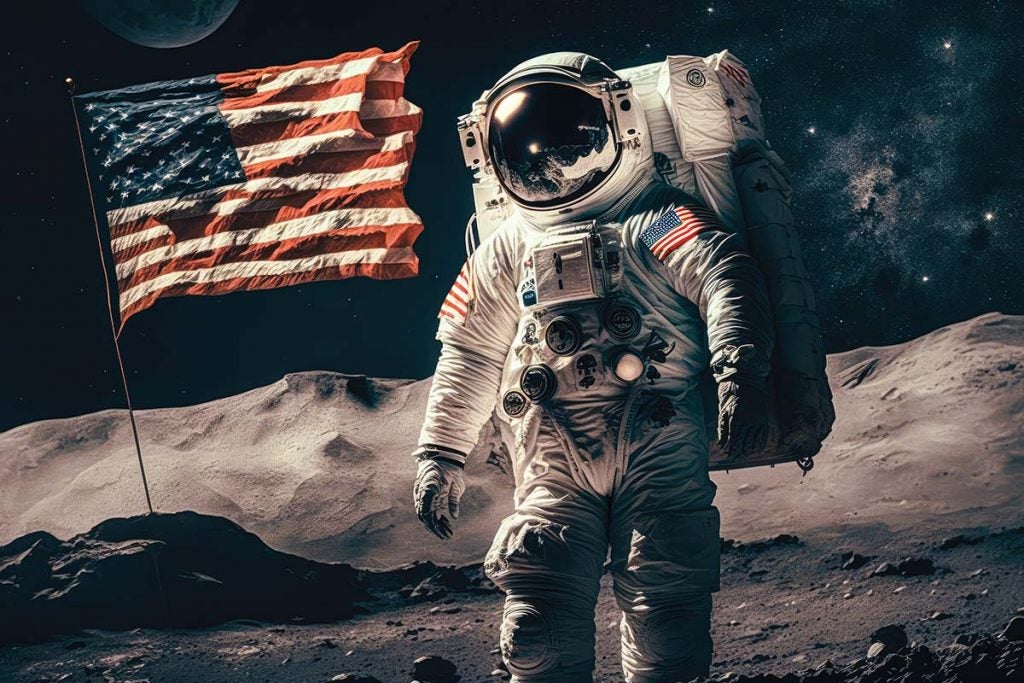
“The hope is that representatives of humankind will populate space, and we’ll treat each other for common good. But will we?”
— Amy Foster, professor of history
Power-hungry rulers have been threats throughout our history, and any strategic mission to dominate space would negate the intent of inhabiting it.
“Work is being done to make sure we have a system in place rather than allowing pure power to take over,” Metzger says. “The consensus is that we don’t need a new space treaty, but it could be a thorny path.”
In anticipation of that path, the U.S. established its sixth military branch, Space Force, in 2019 to defend our security and prosperity in space. It signified thatspace is a defined domain. Historically, new domains are what nations fight over.
“The biggest concern in space isn’t an attack on people or land,” Handberg says. “It’s the possibility of an attack on satellites. If our satellites are taken out, we’re looking at a whole different ballgame.”
It would be devastating because without satellites we’d all be sent somewhere we never thought possible: backward.
The Question of Equity
In the weeks after the Apollo 11 crew returned from their trip to the moon 54 years ago, they traveled to two dozen countries so people could see them with their own eyes. People from all socioeconomic classes celebrated them — from Africa to Mexico to Thailand.
However, when Bezos took flight from the desert of west Texas, people in the nearby town of Van Horn watched the rocket with a mix of awe and indifference.
“This ride is only for the wealthy,” one local shop owner said.
Metzger says that perspective, perhaps more than anything else, must change.
“Our presence in space will need to create opportunities for people from all walks of life, from all over the world. It’s a legitimate concern because the only way for democracy to survive is if everyone owns what we do in space.”

So far, we’ve seen a short parade of the world’s richest people take very expensive trips to the edge and beyond. A ticket to travel 50-some miles up on Virgin Galactic costs $450,000. Passengers on Blue Origin’s NS-22 mission last summer paid $1.25 million for the 10-minute ride. Musk says a ride on SpaceX will soon be “relatively affordable” at $100,000 per seat.
“Unless someone figures this out, we run the risk of going back to the colonial view,” Handberg says. “The strong get stronger. The rich get richer. The poor suffer. We’ve already seen what happens with a digital divide. A space divide would create a much wider gap.”
More flights will eventually begin to mitigate the cost of the technology, which should bring the prices down. The real value, however, isn’t the travel experience, it’s the mission of tapping into resources beyond comprehension.
“Unless someone figures this out, we run the risk of going back to the colonial view. The strong get stronger. The rich get richer. The poor suffer.”
— Robert Handberg, professor of political science
“There will be mining in space, and that can be good for all of us,” Metzger says. “The resources in our solar system will keep us from depleting what’s available on this planet, and for the first time ever there would be an energy surplus for everyone.”
Researchers say there are at least a billion times more usable resources in space than on Earth. A NASA spacecraft is scheduled to explore the asteroid belt in the next three years, including one asteroid called Psyche, which some scientists until recently believed could hold metals worth trillions or quintillions of dollars. Imagine that — and then imagine what people would do to be first to the treasure troves.
If an asteroid worth a fraction of a quintillion is discovered, who would own it? President Barack Obama signed a space resource law in 2015 that allows any company to own the resources it extracts, but not the land — which no one can own under the original Outer Space Treaty. Other countries, including Luxembourg, have passed similar laws.
“It’s like the law of the sea,” says Metzger. “If you catch a fish, you own the fish. But you can’t own the ocean.”
The very idea of mining brings to mind the working class. But something will replace manual labor and socioeconomic groups in space.
“Robots,” Metzger says. “It’s possible that enough robots could be built to do a million times more of the total work than humans can do. We can’t even imagine the capabilities. That’s what will make this type of civilization possible in space while also making life here better.”
Yet the question of ethics lingers.
“I try to be pragmatic,” Foster says. “This could be good for humanity as a whole, but technology won’t make that decision.”
People will have to do that, whether they’re here on Earth or 67 million miles away.
The Question of Environment
Only 12 people have ever walked on the moon. Yet there is believed to be as much as 400,000 pounds of waste there such as lunar landers, backpacks, boots, shovels, a hammer and even bags of fecal matter.
“The technology being developed will minimize the need to take things with us,” Loftin says. “We’re learning to live off what’s there because environmental cleanup is one of the inspirations behind everything we’re doing.”
“We’re learning to live off what’s there because environmental cleanup is one of the inspirations behind everything we’re doing.”
— Phil Metzger ’00MS ’05PhD, ����첥 planetary scientist
Metzger’s work has helped advance the ability to make rocket fuel from lunar ice rather than transporting it from Earth. Instead of discarding inoperable machinery on the moon or Mars, the robots will repair other robots.
“The idea is to send nothing to space that will create waste,” Metzger says.
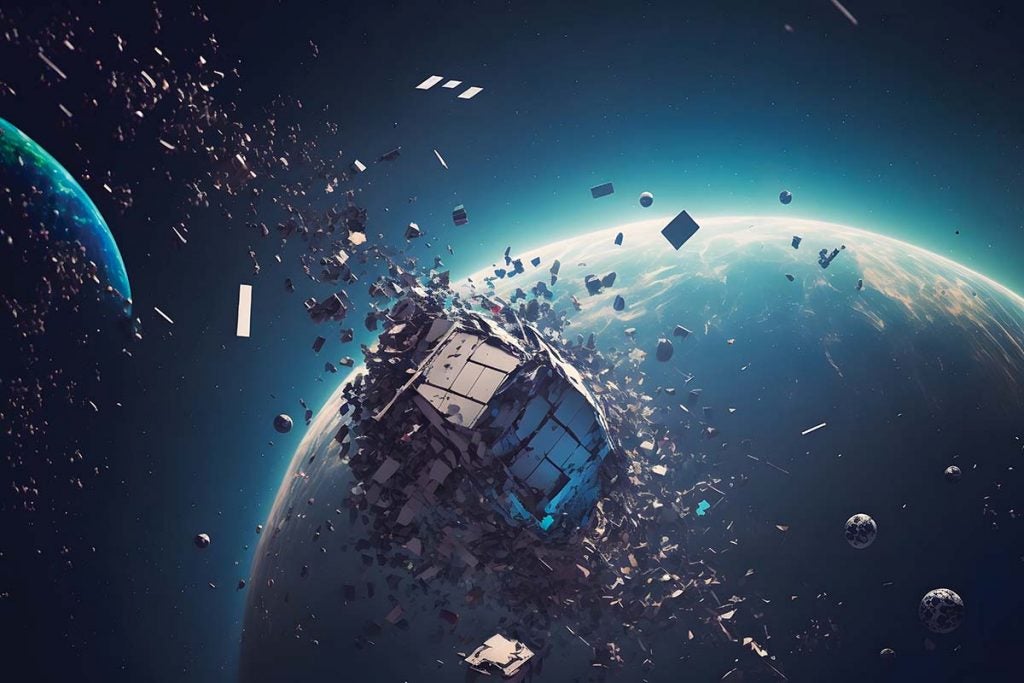
“Mother Nature will survive, but she doesn’t care if she brings us along for the ride.”
— Amy Foster, professor of history
The craft that took Bezos to space operated on liquid oxygen and liquid hydrogen, generating next to zero carbon emissions. On the other hand, a lot of energy is required to build rockets and make the fuel. Scientists also know that every rocket is a threat to our ozone layer. All of which launches another consideration: How much of Earth’s environment and atmosphere need to be compromised to save it?
“Mother Nature will survive,” Foster says, “but she doesn’t care if she brings us along for the ride.”
Unknown Answers
For laypeople, the uncertainties away from Earth seem as endless as the stars in the universe. Will we live in spacesuits? What if they tear? If we can’t survive climate change of several degrees on Earth, how will we survive daily temperature swings of more than 100 degrees on Mars? What about the massive amounts of radiation outside our atmosphere? Will people go blind?
“It’s a Pandora’s box,” Foster says. “With technology, there are always unintended consequences. There’s no way to predict what they might be because we don’t know for what purposes people will use the technology. And the technology we’re talking about is beyond anything we’ve ever seen.”
Metzger vividly remembers the moment that opened his eyes. It was just 13 years ago during a field test on Hawaii’s Big Island. He was about to be honored as Kennedy Space Center’s Scientist of the Year, but he still harbored some doubts about where a lifetime of research was headed until he stood on top of the dormant volcano of Mauna Kea at sunrise. He looked around at researchers who’d come from all over North America with a small team of robots trudging around the otherworldly scene.
“This is going to happen away from Earth,” he remembers thinking. Then another realization struck. “We only have so much time to make sure we get it right on this planet.”
With every passing moment the gap shrinks between life here and life there. Soon they will be one and the same.
















